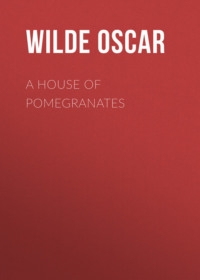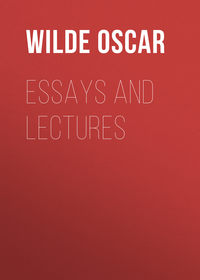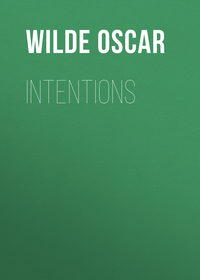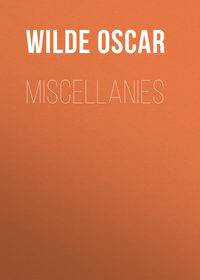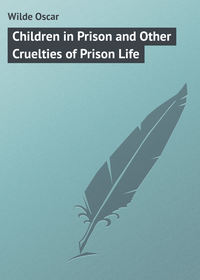 полная версия
полная версияReviews
Finally we come to Sturm und Drang, the work of an anonymous writer. Opening the volume at hazard we come across these graceful lines:
How sweet to spend in this blue bayThe close of life’s disastrous day,To watch the morn break faintly freeAcross the greyness of the sea,What time Memnonian music fillsThe shadows of the dewy hills.Well, here is the touch of a poet, and we pluck up heart and read on. The book is a curious but not inartistic combination of the mental attitude of Mr. Matthew Arnold with the style of Lord Tennyson. Sometimes, as in The Sicilian Hermit, we get merely the metre of Locksley Hall without its music, merely its fine madness and not its fine magic. Still, elsewhere there is good work, and Caliban in East London has a great deal of power in it, though we do not like the adjective ‘knockery’ even in a poem on Whitechapel.
On the whole, to those who watch the culture of the age, the most interesting thing in young poets is not so much what they invent as what masters they follow. A few years ago it was all Mr. Swinburne. That era has happily passed away. The mimicry of passion is the most intolerable of all poses. Now, it is all Lord Tennyson, and that is better. For a young writer can gain more from the study of a literary poet than from the study of a lyrist. He may become the pupil of the one, but he can never be anything but the slave of the other. And so we are glad to see in this volume direct and noble praise of him
* * * * *Who plucked in English meadows flowers fairAs any that in unforgotten staveVied with the orient gold of Venus’ hairOr fringed the murmur of the Ægean wave,which are the fine words in which this anonymous poet pays his tribute to the Laureate.
(1) Echoes of Memory. By Atherton Furlong. (Field and Tuer.)
(2) Sagittulæ. By E. W. Bowling. (Longmans, Green and Co.)
(3) Tuberose and Meadowsweet. By Mark André Raffalovich. (David Bogue.)
(4) Sturm und Drang. (Elliot Stock.)
In reply to the review A Bevy of Poets the following letter was published in the Pall Mall Gazette on March 30, 1885, under the title of
THE ROOT OF THE MATTER
SIR, – I am sorry not to be able to accept the graceful etymology of your reviewer who calls me to task for not knowing how to pronounce the title of my book Tuberose and Meadowsweet. I insist, he fancifully says, ‘on making “tuberose” a trisyllable always, as if it were a potato blossom and not a flower shaped like a tiny trumpet of ivory.’ Alas! tuberose is a trisyllable if properly derived from the Latin tuberosus, the lumpy flower, having nothing to do with roses or with trumpets of ivory in name any more than in nature. I am reminded by a great living poet that another correctly wrote:
Or as the moonlight fills the open skyStruggling with darkness – as a tuberosePeoples some Indian dell with scents which lieLike clouds above the flower from which they rose.In justice to Shelley, whose lines I quote, your readers will admit that I have good authority for making a trisyllable of tuberose. – I am, Sir, your obedient servant,
ANDRÉ RAFFALOVICH.
March 28.
PARNASSUS VERSUS PHILOLOGY
(Pall Mall Gazette, April 1, 1885.)
To the Editor of the Pall Mall Gazette.
SIR, – I am deeply distressed to hear that tuberose is so called from its being a ‘lumpy flower.’ It is not at all lumpy, and, even if it were, no poet should be heartless enough to say so. Henceforth, there really must be two derivations for every word, one for the poet and one for the scientist. And in the present case the poet will dwell on the tiny trumpets of ivory into which the white flower breaks, and leave to the man of science horrid allusions to its supposed lumpiness and indiscreet revelations of its private life below ground. In fact, ‘tuber’ as a derivation is disgraceful. On the roots of verbs Philology may be allowed to speak, but on the roots of flowers she must keep silence. We cannot allow her to dig up Parnassus. And, as regards the word being a trisyllable, I am reminded by a great living poet that another correctly wrote:
And the jessamine faint, and the sweet tuberose,The sweetest flower for scent that blows;And all rare blossoms from every climeGrew in that garden in perfect prime.In justice to Shelley, whose lines I quote, your readers will admit that I have good authority for making a dissyllable of tuberose. – I am, Sir, your obedient servant,
THE CRITIC,
WHO HAD TO READ FOUR VOLUMES OF MODERN POETRY.
March 30.
HAMLET AT THE LYCEUM
(Dramatic Review, May 9, 1885.)
It sometimes happens that at a première in London the least enjoyable part of the performance is the play. I have seen many audiences more interesting than the actors, and have often heard better dialogue in the foyer than I have on the stage. At the Lyceum, however, this is rarely the case, and when the play is a play of Shakespeare’s, and among its exponents are Mr. Irving and Miss Ellen Terry, we turn from the gods in the gallery and from the goddesses in the stalls, to enjoy the charm of the production, and to take delight in the art. The lions are behind the footlights and not in front of them when we have a noble tragedy nobly acted. And I have rarely witnessed such enthusiasm as that which greeted on last Saturday night the two artists I have mentioned. I would like, in fact, to use the word ovation, but a pedantic professor has recently informed us, with the Batavian buoyancy of misapplied learning, that this expression is not to be employed except when a sheep has been sacrificed. At the Lyceum last week I need hardly say nothing so dreadful occurred. The only inartistic incident of the evening was the hurling of a bouquet from a box at Mr. Irving while he was engaged in pourtraying the agony of Hamlet’s death, and the pathos of his parting with Horatio. The Dramatic College might take up the education of spectators as well as that of players, and teach people that there is a proper moment for the throwing of flowers as well as a proper method.
As regards Mr. Irving’s own performance, it has been already so elaborately criticised and described, from his business with the supposed pictures in the closet scene down to his use of ‘peacock’ for ‘paddock,’ that little remains to be said; nor, indeed, does a Lyceum audience require the interposition of the dramatic critic in order to understand or to appreciate the Hamlet of this great actor. I call him a great actor because he brings to the interpretation of a work of art the two qualities which we in this century so much desire, the qualities of personality and of perfection. A few years ago it seemed to many, and perhaps rightly, that the personality overshadowed the art. No such criticism would be fair now. The somewhat harsh angularity of movement and faulty pronunciation have been replaced by exquisite grace of gesture and clear precision of word, where such precision is necessary. For delightful as good elocution is, few things are so depressing as to hear a passionate passage recited instead of being acted. The quality of a fine performance is its life more than its learning, and every word in a play has a musical as well as an intellectual value, and must be made expressive of a certain emotion. So it does not seem to me that in all parts of a play perfect pronunciation is necessarily dramatic. When the words are ‘wild and whirling,’ the expression of them must be wild and whirling also. Mr. Irving, I think, manages his voice with singular art; it was impossible to discern a false note or wrong intonation in his dialogue or his soliloquies, and his strong dramatic power, his realistic power as an actor, is as effective as ever. A great critic at the beginning of this century said that Hamlet is the most difficult part to personate on the stage, that it is like the attempt to ‘embody a shadow.’ I cannot say that I agree with this idea. Hamlet seems to me essentially a good acting part, and in Mr. Irving’s performance of it there is that combination of poetic grace with absolute reality which is so eternally delightful. Indeed, if the words easy and difficult have any meaning at all in matters of art, I would be inclined to say that Ophelia is the more difficult part. She has, I mean, less material by which to produce her effects. She is the occasion of the tragedy, but she is neither its heroine nor its chief victim. She is swept away by circumstances, and gives the opportunity for situation, of which she is not herself the climax, and which she does not herself command. And of all the parts which Miss Terry has acted in her brilliant career, there is none in which her infinite powers of pathos and her imaginative and creative faculty are more shown than in her Ophelia. Miss Terry is one of those rare artists who needs for her dramatic effect no elaborate dialogue, and for whom the simplest words are sufficient. ‘I love you not,’ says Hamlet, and all that Ophelia answers is, ‘I was the more deceived.’ These are not very grand words to read, but as Miss Terry gave them in acting they seemed to be the highest possible expression of Ophelia’s character. Beautiful, too, was the quick remorse she conveyed by her face and gesture the moment she had lied to Hamlet and told him her father was at home. This I thought a masterpiece of good acting, and her mad scene was wonderful beyond all description. The secrets of Melpomene are known to Miss Terry as well as the secrets of Thalia. As regards the rest of the company there is always a high standard at the Lyceum, but some particular mention should be made of Mr. Alexander’s brilliant performance of Laertes. Mr. Alexander has a most effective presence, a charming voice, and a capacity for wearing lovely costumes with ease and elegance. Indeed, in the latter respect his only rival was Mr. Norman Forbes, who played either Guildenstern or Rosencrantz very gracefully. I believe one of our budding Hazlitts is preparing a volume to be entitled ‘Great Guildensterns and Remarkable Rosencrantzes,’ but I have never been able myself to discern any difference between these two characters. They are, I think, the only characters Shakespeare has not cared to individualise. Whichever of the two, however, Mr. Forbes acted, he acted it well. Only one point in Mr. Alexander’s performance seemed to me open to question, that was his kneeling during the whole of Polonius’s speech. For this I see no necessity at all, and it makes the scene look less natural than it should – gives it, I mean, too formal an air. However, the performance was most spirited and gave great pleasure to every one. Mr. Alexander is an artist from whom much will be expected, and I have no doubt he will give us much that is fine and noble. He seems to have all the qualifications for a good actor.
There is just one other character I should like to notice. The First Player seemed to me to act far too well. He should act very badly. The First Player, besides his position in the dramatic evolution of the tragedy, is Shakespeare’s caricature of the ranting actor of his day, just as the passage he recites is Shakespeare’s own parody on the dull plays of some of his rivals. The whole point of Hamlet’s advice to the players seems to me to be lost unless the Player himself has been guilty of the fault which Hamlet reprehends, unless he has sawn the air with his hand, mouthed his lines, torn his passion to tatters, and out-Heroded Herod. The very sensibility which Hamlet notices in the actor, such as his real tears and the like, is not the quality of a good artist. The part should be played after the manner of a provincial tragedian. It is meant to be a satire, and to play it well is to play it badly. The scenery and costumes were excellent with the exception of the King’s dress, which was coarse in colour and tawdry in effect. And the Player Queen should have come in boy’s attire to Elsinore.
However, last Saturday night was not a night for criticism. The theatre was filled with those who desired to welcome Mr. Irving back to his own theatre, and we were all delighted at his re-appearance among us. I hope that some time will elapse before he and Miss Terry cross again that disappointing Atlantic Ocean.
TWO NEW NOVELS
(Pall Mall Gazette, May 15, 1885.)
The clever authoress of In the Golden Days has chosen for the scene of her story the England of two centuries ago, as a relief, she tells us in her preface, ‘from perpetual nineteenth-centuryism.’ Upon the other hand, she makes a pathetic appeal to her readers not to regard her book as an ‘historical novel,’ on the ground that such a title strikes terror into the public. This seems to us rather a curious position to take up. Esmond and Notre Dame are historical novels, both of them, and both of them popular successes. John Inglesant and Romola have gone through many editions, and even Salammbo has its enthusiasts. We think that the public is very fond of historical novels, and as for perpetual ‘nineteenth-centuryism’ – a vile phrase, by the way – we only wish that more of our English novelists studied our age and its society than do so at present. However, In the Golden Days must not be judged by its foolish preface. It is really a very charming book, and though Dryden, Betterton, and Wills’s Coffee-House are dragged in rather à propos de bottes, still the picture of the time is well painted. Joyce, the little Puritan maiden, is an exquisite creation, and Hugo Wharncliffe, her lover, makes a fine hero. The sketch of Algernon Sidney is rather colourless, but Charles II. is well drawn. It seems to be a novel with a high purpose and a noble meaning. Yet it is never dull.
Mrs. Macquoid’s Louisa is modern and the scene is in Italy. Italy, we fear, has been a good deal overdone in fiction. A little more Piccadilly and a little less Perugia would be a relief. However, the story is interesting. A young English girl marries an Italian nobleman and, after some time, being bored with picturesqueness, falls in love with an Englishman. The story is told with a great deal of power and ends properly and pleasantly. It can safely be recommended to young persons.
(1) In the Golden Days. By Edna Lyall, Author of We Two, Donovan, etc. (Hurst and Blackett.)
(2) Louisa. By Katherine S. Macquoid. (Bentley and Son.)
HENRY THE FOURTH AT OXFORD
(Dramatic Review, May 23, 1885.)
I have been told that the ambition of every Dramatic Club is to act Henry IV. I am not surprised. The spirit of comedy is as fervent in this play as is the spirit of chivalry; it is an heroic pageant as well as an heroic poem, and like most of Shakespeare’s historical dramas it contains an extraordinary number of thoroughly good acting parts, each of which is absolutely individual in character, and each of which contributes to the evolution of the plot.
Rumour, from time to time, has brought in tidings of a proposed production by the banks of the Cam, but it seems at the last moment Box and Cox has always had to be substituted in the bill.
To Oxford belongs the honour of having been the first to present on the stage this noble play, and the production which I saw last week was in every way worthy of that lovely town, that mother of sweetness and of light. For, in spite of the roaring of the young lions at the Union, and the screaming of the rabbits in the home of the vivisector, in spite of Keble College, and the tramways, and the sporting prints, Oxford still remains the most beautiful thing in England, and nowhere else are life and art so exquisitely blended, so perfectly made one. Indeed, in most other towns art has often to present herself in the form of a reaction against the sordid ugliness of ignoble lives, but at Oxford she comes to us as an exquisite flower born of the beauty of life and expressive of life’s joy. She finds her home by the Isis as once she did by the Ilissus; the Magdalen walks and the Magdalen cloisters are as dear to her as were ever the silver olives of Colonus and the golden gateway of the house of Pallas: she covers with fanlike tracery the vaulted entrance to Christ Church Hall, and looks out from the windows of Merton; her feet have stirred the Cumnor cowslips, and she gathers fritillaries in the river-fields. To her the clamour of the schools and the dulness of the lecture-room are a weariness and a vexation of spirit; she seeks not to define virtue, and cares little for the categories; she smiles on the swift athlete whose plastic grace has pleased her, and rejoices in the young Barbarians at their games; she watches the rowers from the reedy bank and gives myrtle to her lovers, and laurel to her poets, and rue to those who talk wisely in the street; she makes the earth lovely to all who dream with Keats; she opens high heaven to all who soar with Shelley; and turning away her head from pedant, proctor and Philistine, she has welcomed to her shrine a band of youthful actors, knowing that they have sought with much ardour for the stern secret of Melpomene, and caught with much gladness the sweet laughter of Thalia. And to me this ardour and this gladness were the two most fascinating qualities of the Oxford performance, as indeed they are qualities which are necessary to any fine dramatic production. For without quick and imaginative observation of life the most beautiful play becomes dull in presentation, and what is not conceived in delight by the actor can give no delight at all to others.
I know that there are many who consider that Shakespeare is more for the study than for the stage. With this view I do not for a moment agree. Shakespeare wrote the plays to be acted, and we have no right to alter the form which he himself selected for the full expression of his work. Indeed, many of the beauties of that work can be adequately conveyed to us only through the actor’s art. As I sat in the Town Hall of Oxford the other night, the majesty of the mighty lines of the play seemed to me to gain new music from the clear young voices that uttered them, and the ideal grandeur of the heroism to be made more real to the spectators by the chivalrous bearing, the noble gesture and the fine passion of its exponents. Even the dresses had their dramatic value. Their archæological accuracy gave us, immediately on the rise of the curtain, a perfect picture of the time. As the knights and nobles moved across the stage in the flowing robes of peace and in the burnished steel of battle, we needed no dreary chorus to tell us in what age or land the play’s action was passing, for the fifteenth century in all the dignity and grace of its apparel was living actually before us, and the delicate harmonies of colour struck from the first a dominant note of beauty which added to the intellectual realism of archæology the sensuous charm of art.
As for individual actors, Mr. Mackinnon’s Prince Hal was a most gay and graceful performance, lit here and there with charming touches of princely dignity and of noble feeling. Mr. Coleridge’s Falstaff was full of delightful humour, though perhaps at times he did not take us sufficiently into his confidence. An audience looks at a tragedian, but a comedian looks at his audience. However, he gave much pleasure to every one, and Mr. Bourchier’s Hotspur was really most remarkable. Mr. Bourchier has a fine stage presence, a beautiful voice, and produces his effects by a method as dramatically impressive as it is artistically right. Once or twice he seemed to me to spoil his last line by walking through it. The part of Harry Percy is one full of climaxes which must not be let slip. But still there was always a freedom and spirit in his style which was very pleasing, and his delivery of the colloquial passages I thought excellent, notably of that in the first act:
What d’ ye call the place?A plague upon’t – it is in Gloucestershire;’Twas where the madcap duke his uncle kept,His uncle York;lines by the way in which Kemble made a great effect. Mr. Bourchier has the opportunity of a fine career on the English stage, and I hope he will take advantage of it. Among the minor parts in the play Glendower, Mortimer and Sir Richard Vernon were capitally acted, Worcester was a performance of some subtlety, Mrs. Woods was a charming Lady Percy, and Lady Edward Spencer Churchill, as Mortimer’s wife, made us all believe that we understood Welsh. Her dialogue and her song were most pleasing bits of artistic realism which fully accounted for the Celtic chair at Oxford.
But though I have mentioned particular actors, the real value of the whole representation was to be found in its absolute unity, in its delicate sense of proportion, and in that breadth of effect which is to be got only by the most careful elaboration of detail. I have rarely seen a production better stage-managed. Indeed, I hope that the University will take some official notice of this delightful work of art. Why should not degrees be granted for good acting? Are they not given to those who misunderstand Plato and who mistranslate Aristotle? And should the artist be passed over? No. To Prince Hal, Hotspur and Falstaff, D.C.L.’s should be gracefully offered. I feel sure they would be gracefully accepted. To the rest of the company the crimson or the sheep-skin hood might be assigned honoris causâ to the eternal confusion of the Philistine, and the rage of the industrious and the dull. Thus would Oxford confer honour on herself, and the artist be placed in his proper position. However, whether or not Convocation recognises the claims of culture, I hope that the Oxford Dramatic Society will produce every summer for us some noble play like Henry IV. For, in plays of this kind, plays which deal with bygone times, there is always this peculiar charm, that they combine in one exquisite presentation the passions that are living with the picturesqueness that is dead. And when we have the modern spirit given to us in an antique form, the very remoteness of that form can be made a method of increased realism. This was Shakespeare’s own attitude towards the ancient world, this is the attitude we in this century should adopt towards his plays, and with a feeling akin to this it seemed to me that these brilliant young Oxonians were working. If it was so, their aim is the right one. For while we look to the dramatist to give romance to realism, we ask of the actor to give realism to romance.
MODERN GREEK POETRY
(Pall Mall Gazette, May 27, 1885.)
Odysseus, not Achilles, is the type of the modern Greek. Merchandise has taken precedence of the Muses and politics are preferred to Parnassus. Yet by the Illissus there are sweet singers; the nightingales are not silent in Colonus; and from the garden of Greek nineteenth-century poetry Miss Edmonds has made a very pleasing anthology; and in pouring the wine from the golden into the silver cup she has still kept much of the beauty of the original. Even when translated into English, modern Greek lyrics are preferable to modern Greek loans.
As regards the quality of this poetry, if the old Greek spirit can be traced at all, it is the spirit of Tyrtæus and of Theocritus. The warlike ballads of Rhigas and Aristotle Valaôritês have a fine ring of music and of passion in them, and the folk-songs of George Drosinês are full of charming pictures of rustic life and delicate idylls of shepherds’ courtships. These we acknowledge that we prefer. The flutes of the sheepfold are more delightful than the clarions of battle. Still, poetry played such a noble part in the Greek War of Independence that it is impossible not to look with reverence on the spirited war-songs that meant so much to those who were righting for liberty and mean so much even now to their children.
Other poets besides Drosinês have taken the legends that linger among the peasants and given to them an artistic form. The song of The Seasons is full of beauty, and there is a delightful poem on The Building of St. Sophia, which tells how the design of that noble building was suggested by the golden honeycomb of a bee which had flown from the king’s palace with a crumb of blessed bread that had fallen from the king’s hands. The story is still to be found in Thrace.
One of the ballads, also, has a good deal of spirit. It is by Kostês Palamas and was suggested by an interesting incident which occurred some years ago in Athens. In the summer of 1881 there was borne through the streets the remains of an aged woman in the complete costume of a Pallikar, which dress she had worn at the siege of Missolonghi and in it had requested to be buried. The life of this real Greek heroine should be studied by those who are investigating the question of wherein womanliness consists. The view the poet takes of her is, we need hardly say, very different from that which Canon Liddon would entertain. Yet it is none the less fine on this account, and we are glad that this old lady has been given a place in art. The volume is, on the whole, delightful reading, and though not much can be said for lines like these:


